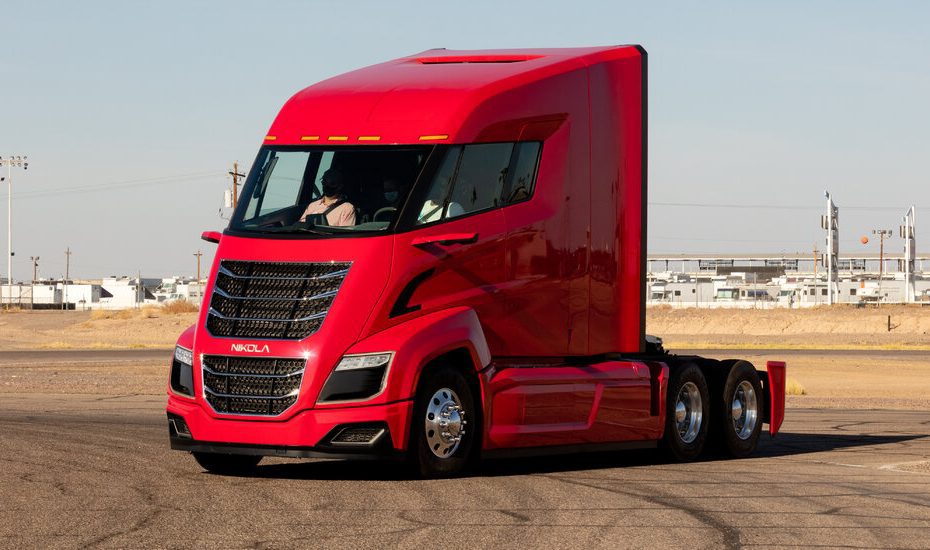Nikola, a start-up of electric vehicles that once hoped to become the Tesla of heavy trucks, presented bankruptcy on Wednesday.
Nikola, founded in 2015, promised to develop semi-trucks with long-distance that are powered by hydrogen and electricity, and mentioned in 2020 on the stock exchange in 2020 before it had sold a single vehicle. The share price rose briefly as individual investors and some Wall Street companies screamed to bet on companies that they thought could replicate the success of Tesla and the rising share price.
The short -lived enthusiasm of investors for Nikola made his founder, Trevor Milton, and other early investors. But it didn't take long, there were important doubts about Mr Milton's claims about the technology and orders of the customer's company. He soon resigned and was later convicted of fraud.
In the past quarters, Nikola had started delivering small numbers of electric trucks, but far too little to make money. At the end of last year, the company said it had $ 200 million in cash and $ 270 million in long -term debts. The shares fell at the beginning of this month on reports that the company was approaching a bankruptcy application.
The company said in a release on Wednesday that it had around $ 47 million in cash and was planning to continue the “limited” service and support for trucks on the road. The bankruptcy application stated liabilities from $ 1 billion to $ 10 billion and sets the number of creditors that the company owes at 1,000 to 5,000. The biggest creditor is the Securities and Exchange Commission, which owes $ 80.2 million for a settlement that the company reached with the agency in 2021.
The company said it was planning to use the bankruptcy process to sell a lot or all its assets and to wrap its companies.
Nikola is one of the many young electricity companies that have had difficulty turning their ideas into actual cars and trucks.
Lordstown Motors, who had tried to make Pick -Up Trucks in a closed general engines in Ohio, sought bankruptcy protection in 2023 and was accused of misleading investors in 2024 by the SEC
A British start-up, arrival, intended to make electric vans and buses. But it had difficulty having his vehicle and production ideas work and then sold his assets to another start-up, Cano. That company applied for bankruptcy protection last month.
A few start-ups for electric vehicles still work, although their stock prices have fallen and it is not clear how or when they will become profitable.
Rivian, which makes electric pick -ups and vehicles for sport utility, has had problems raising production to the levels that it was originally focused on, and the shares are trade at slightly less than $ 13 per share – a tenth of Where it was at the end of 2021. But the company secured an important lifeline last year when it founded a partnership with the German car maker Volkswagen, who took a great importance in Rivian.
Lucid Motors makes luxury electric cars and SUVs, but has been achieved well at its original sales and production goals. It also hopes to close deals in which it sells its technology to other car manufacturers.
“Like other companies in the electric vehicle industry, we have had to deal with various market and macro -economic factors that have influenced our ability to operate,” said Steve Girsky, CEO of Nikola, in a statement on Wednesday. “Unfortunately, our very best efforts have not been sufficient to overcome these important challenges.”
Before founding Nikola, Mr. Milton started a security alarm company and another who tried to run diesel engines on natural gas. He called his company after the inventor Nikola Tesla, whose last name was used by the founders of the Electric Car Company.
Nikola was planning to make trucks that work on hydrogen and build a network of hydrogen stations. Mr. Milton said investors that Nikola had working prototypes of emission-free long-distance cars and had billions of dollars in binding orders.
In 2020, Nikola joined the stock market by merging with a special acquisition company, which has a list of little else. That strategy, which also used other start-ups for electric vehicles, avoids the greater control that belongs to the first public offer.
A few months after Nikola shares started trade, a small investment firm, Hindenburg Research, issued a report that said that Mr Milton had greatly overestimated the technological development of the company. The report also said that the company produced a video in 2017 in which a truck was rolled up to make it look like it had a working prototype.
Nikola initially called the report false and defamatory, but weeks later Mr. Milton resigned. In 2023 he was sentenced to four years in prison after being convicted of securities and wire fraud. Mr Milton, who appeals to his conviction, could not be achieved for comment.
Two new chief executives had arrived and gone by 2023, and Mr Girsky, a former Vice chairman of GM who was involved in taking Nikola Public, took the top job. Nikola eventually started producing trucks driven by hydrogen fuel cells and sold 200 in the first nine months of last year.

